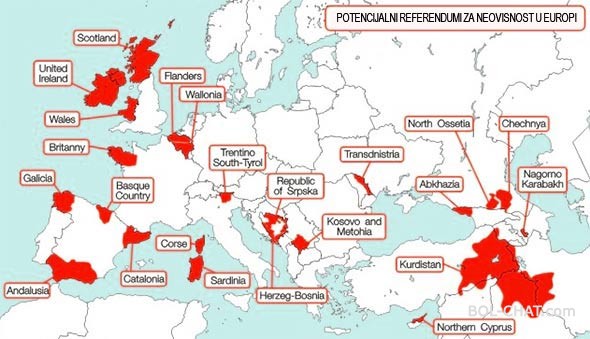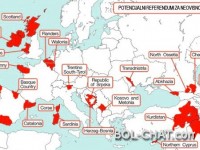GLOBALISTS IN SHOCK: Who else wants independence?
Basque, Scotland, Flanders, South Tyrol, Corsica, Bavaria ... many regions of Western Europe have long sought independence from their countries of origin or at least point to that idea

The collapse of the SFR Yugoslavia and the Soviet Union has created many new states in the eastern part of Europe. But in the west of the continent the boundaries were as carved into stone. Bar at first glance. It was, however, the group that sought secession, some of them militant, but with poor effect. Events in Catalonia could give new strength to a whole series of secession movements in Western Europe.
Basque
The Catalonian independence drive is largely a consequence of the financial aid that Madrid sends to Basque and Navarre with the capital of Pamplona. Basque nationalism and the Basque language were also suppressed during the Franco regime. The Basque country is much weaker than Catalonia, but the separatists there are far more violent. In the fight for independence from Madrid, ETA has killed more than 800 people over the past 50 years. However, this separatist movement in 2011 publicly renounced violence. On the road to independence, they still tap into the place. The referendum of 2014 was symbolic and unrecognizable.
Scotland
Nowhere in the west of Europe did it seem so likely to print new geographic maps as in the case of Scotland. The union of Scotland and the rest of Great Britain has been in existence for over 300 years. But in the 2014 referendum, which was agreed by London, the pro-independence leaders tightly lost. However, Britain's withdrawal from the EU led the leadership in Edinburgh to consider holding a new referendum, perhaps already in 2018. Namely, the Scots were mostly for staying in the EU. Polls, however, say the outcome of the next referendum on independence would be similar to the previous one.
Flanders
In the latest parliamentary elections in Belgium, the Flanders' strongest party was the New Flemish Alliance, led by Bart de Wever. This politician believes that the Belgian state is before the breakup and that it should build an autonomous Flanders.Separateism in Belgium is quite unusual
- If the Flemish section in which the Dutch variant is cut off, the state will lose more than half the population, but also economic power. The big problem would be the status of Brussels in which the European Union and NATO headquarters are located. Some have already mentioned the merging of Francophonie Wallonia to France, Luxembourg, and even Germany. So far, the Belgians have managed to stick together.
"Padania"
The secession of the north of Italy has full economic initiatives. Namely, there are developed regions of Lombardy, Piedmont, Venice, as well as other rich and industrialized areas. Many citizens in that part of the country believe that the Italians from the south live on the arms of the diligent nurses. The so-called "Lega Nord" used to seek an independent "Padania", an area that would encompass the developed north of today's Italy. Today, it is scattering around the demand that three quarters of the money will be left in the region.
South Tyrol
And this area is officially within the borders of Italy, but only from the end of the First World War. Previously, it was part of the Austro-Hungarian Empire. After the death of Mussolini, South Tyrol gradually gained an increasing linguistic and political economy.
The inhabitants of that region also had much of the money collected from taxes and seemed to run smoothly. But the economic crisis has awakened separatism again.
Italy, after Greece, the second after the indebtedness in the euro zone and torture is a major economic difficulty. Tyrols are wealthy and do not want to burden the problems of a common Italian state. The slogan is heard louder: More from Rome.
Corsica
The French authorities have long suppressed the autonomous tendencies on that island, including the use of local language in schools and public life.
For years, militant groups such as the FLNC have been trying to detach violently from Paris, carrying out attacks on officials or symbols of the French state. In the summer of 2014, the FLNC movement announced that it would no longer serve violence. But the potential for conflict remains - when the French government in 2000 proposed rather inconceivable measures to increase Corsican autonomy, the conservative opposition in that country emerged on the barricades.
Bavaria
A very small number of Bavarians seriously think that setting up their own state is the right move. And yet, the official title of this German province is "Der Freistaat Bayern", or "Free State of Bavaria". This German federal unit in the south of the country could probably have managed separately from the rest of Germany.
Bavaria has the largest area of all German states, with 13 million inhabitants, and it has the largest economic turnover in Germany. As in other countries, this wealth is causing tremors - the Bavarians believe that too much money goes to a joint cashier.
However, there are even sharper attitudes. A member of the Bavarian Christian Democratic Union (CSU), journalist Wilfried Scharnagl, in his book "Bavaria can and herself" in 2012 advocated for exit from the Federal Republic of Germany. For now, there is no nationwide movement that shares its attitudes.
- 5 Oct, 2017
- 5572 views
- No comments


